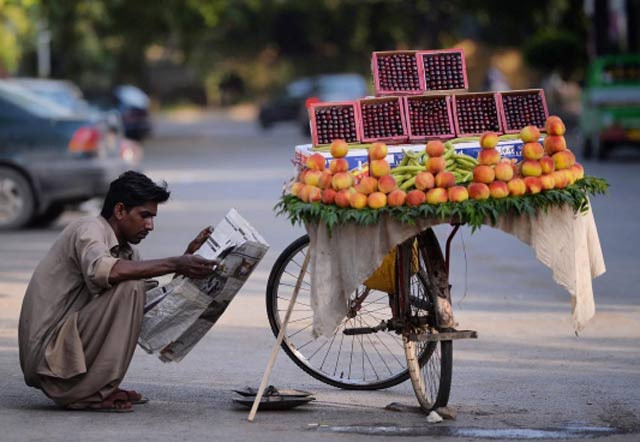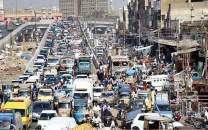Will a fruit boycott bear fruit?
Residents of Karachi plan to boycott fruit for three days to protest high prices

Residents of Karachi plan to boycott fruit for three days to protest high prices. PHOTO: AFP
Instead of a reduction in prices, this Ramazan has seen a hike in the price of essential commodities, as the government failed to implement its fixed prices.
Even Karachi Commissioner Ejaz Ahmed Khan extended his support to the campaign, via a statement, along with Transport Minister Nasir Hussain Shah. In his statement, Khan promised the public that he will open his fast with dates and will eat only roti and saag. Only imposing fines, he said, will not help. "Sometimes we need to take a stand. I hope the people of Karachi will join me in this," he said.
Prices to be controlled during Ramazan
The campaign
A message began circulating on Whatsapp, with a title of 'Important Information' in bold at the top of the message. It stated that the the citizens of Karachi have boycotted the purchase of fruit for three days and everyone should refrain from buying fruit so that rates are lowered. "As much as you can circulate this message please do so, so that the entire city could participate in this campaign," read the message.
Later, a Facebook event was created to woo the people of Karachi into joining the campaign. Facebook and Twitter newsfeeds were flooded with posts against the Sindh government for being unable to keep the prices of fruits lower in the month of Ramazan.
Some posted in support of the boycott, while some said that people would buy three days' worth of fruit on Thursday. Zain Awan, in his Facebook status, said that the boycott would only affect the ones selling fruit on roads not the real culprits.
Will it be fruitful?
Despite the fact that Khan has extended his support to the campaign, economist and Chief Executive Officer of EFG-Hermes, Pakistan Muzammil Aslam thinks the campaign will not bear fruit. Speaking to The Express Tribune, he said that there are three main parties involved in this business – the producers, middle-men and consumers.
Despite govt efforts, prices of essentials soar in Ramazan
The middle-man, he said, includes the wholesaler and the retailer, who earns the premium. If the boycott occurs, he said the middle man will not buy fruit from the producer for a few days. "They won't create a demand at the producer's end," he said and added that resultantly, the producer and consumer would suffer.
There is a chance that if the middlemen do not buy fruit, it will rot. And in all likelihood the consumer will only continue the boycott for a few days. Prices cannot be brought under control, according to Aslam, unless the government introduces regulations for price control. Local governments throughout the world are tasked with bringing the prices of food items under control during such festivities.
Wholesalers
Vice-chairperson of Sabzimandi, an online fruit and vegetable retailer, Asif Ahmed Shah who is also a wholesaler, blamed the Sindh government for being unable to control the prices. On Monday, the price list of commissioner officer had mangos priced at Rs103 for the retail market, whereas, he said that the wholesale and even the export rate was Rs70. "How could the official price be Rs103?" he asked.
Ramazan bazaars become functional
Explaining how the prices are drafted, he said that a meeting was held at the commissioner officer before Ramazan in which it was decided that on the wholesale price, there would be 10% profit for retailers, 10% would be kept for wastage - that is because around one kilogramme of the fruit usually rots - and 10% would be for transportation and labour charges.
With this calculation, he said that if the price of a good quality mango is Rs70 in wholesale market, it should not be more than Rs91 in the retail market. Unfortunately, from huge supermarkets to street cart vendors, no one follows the mechanism and government seems to be doing nothing about it, he said.



















COMMENTS
Comments are moderated and generally will be posted if they are on-topic and not abusive.
For more information, please see our Comments FAQ